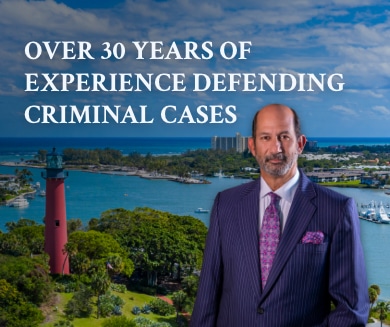Legally Reviewed By:
Brian P. Gabriel, Esquire
Assault, Aggravated Assault, and Aggravated Battery
 After grabbing a few drinks with friends at a local bar, another patron starts getting rowdy. A few insults pass between the two of you, and they start to get physically aggressive. What are you to do? In this scenario, if you hit them back, you could be charged with a violent crime.
After grabbing a few drinks with friends at a local bar, another patron starts getting rowdy. A few insults pass between the two of you, and they start to get physically aggressive. What are you to do? In this scenario, if you hit them back, you could be charged with a violent crime.
Getting arrested for assault or battery can lead to serious, potentially life-long consequences. Criminal Defense Attorney Brian Gabriel has more than 30 years of experience representing individuals suspected of violent crimes, including assault, aggravated assault, and battery. Mr. Gabriel has seen first-hand how important it is to fight these charges with vigor.
What Does the State of Florida Consider Simple Assault?
In Florida, assault is intentionally threatening or acting in a way that causes a person to feel afraid for their safety. A threat is considered assault if it would cause a reasonable person to be afraid of the behavior and believe they are about to get hurt.
To be guilty of assault under Florida Statute 784.011, there are three criteria that must be proved at trial beyond a reasonable doubt. They are:
The defendant intentionally and unlawfully, through their words or actions, threatened to do violence against the alleged victim.
The defendant, at the time the threat was made, seemed capable of acting upon the threat; and
The threat instilled a well-founded fear in the victim’s mind that violence was going to occur.
A simple assault charge in Florida is penalized as a first-degree misdemeanor, punishable by up to one year in jail and up to a $1,000 fine.
Simple Assault in Florida
Florida Assault Statutes define assault as “an intentional, unlawful threat by word or act to do violence to the person of another, coupled with an apparent ability to do so, and doing some act which creates a well-founded fear in such other person that such violence is imminent.” This means that in order to be guilty of assault all three criteria must be met. In order for assault to be proved at trial, the State must establish the following elements beyond a reasonable doubt:
- The defendant intentionally and unlawfully, through his words or actions, threatened to do violence against the alleged victim.
- The defendant, at the time the threat was made, seemed capable of acting upon the threat; and
- The threat instilled a well-founded fear in the victim’s mind that violence was going to occur.
An experienced Florida assault defense lawyer will aim to uncover and present evidence that pokes holes in the State’s case against you. Find out how you can protect your future by contacting The Law Office of Gabriel & Gabriel.
What To Know About Aggravated Assault Charges in Florida
Assault charges in Florida can be elevated to aggravated assault if the incident involved the use of a deadly weapon without intent to kill or with the intention of committing a felony under Florida Statute 784.021. This is where assault differentiates from battery because, with assault, intent to injure is not required, only the intent to create fear in the victim’s mind of impending violence. This can be as simple as someone pointing a gun at another person.
The State considers a “deadly weapon” as any object or substance that can inflict mortal or great bodily harm. Examples include:
- Firearms
- Knives
- Baseball bats
- Motor vehicles
- Power tools
- Gardening tools
- Poisonous substances (such as bleach)
Aggravated assault is a third-degree felony offense in Florida. If the assault involved multiple victims, the defendant might face multiple assault charges. A conviction could lead to up to 5 years in state prison. Penalties can also be amplified by Florida’s 10-20-Life Law.
How Does Florida Define Aggravated Battery?
Battery differs from assault because it implies that actual, physical, and intentional contact occurred with the victim, making it a more serious crime. Aggravated battery occurs when someone with a deadly weapon strikes another person against their will or intentionally causes them bodily harm.
This means that in order to be convicted of aggravated battery under Florida Statute 784.045, the offender must have knowingly and intentionally used a deadly weapon and knowingly and intentionally caused permanent disfigurement, disability, or great bodily harm to another person.
Simple battery can also be raised to aggravated battery if the crime was committed against a pregnant woman if the defendant should have known or knew about the pregnancy.
Aggravated battery is a second-degree felony punishable by up to 15 years in a Florida state prison.
How A Florida Assault Lawyer Can Help Defend a Charge for Assault or Battery
Upon learning the details of your case, your assault defense attorney will work to build a defense strategy that casts you in the best light possible. Potential defenses for assault or battery include the following:
- Self-defense: This requires showing that the instigator threatened unlawful force or harm and you perceived fear of harm to yourself. There must have been no reasonable chance of escaping the situation, and it must be proven that you did not harm or provoke the instigator.
- Defending someone else: The actions that led to your assault charge might be justified if your assault defense lawyer can show you were protecting someone else.
- Defending property: You may be able to claim you acted in defense of your property against being invaded or illegally withheld. This defense is typically more successful in cases where the defendant allegedly assaulted another person while in their own home.
Fight a Charge for Assault, Aggravated Assault, or Aggravated Battery in Florida
When facing violent felony criminal charges, do not hesitate to seek experienced legal counsel. Assault Defense Attorney Brian Gabriel knows what is required to properly communicate the facts of the case and negotiate with prosecutors to possibly get your assault charge reduced or, in some cases, dismissed entirely.
Start with a free consultation today by calling Florida Assault Defense Attorney Brian Gabriel of The Law Office of Gabriel & Gabriel at (561) 622-5575. You can also complete an online contact form to learn more.










